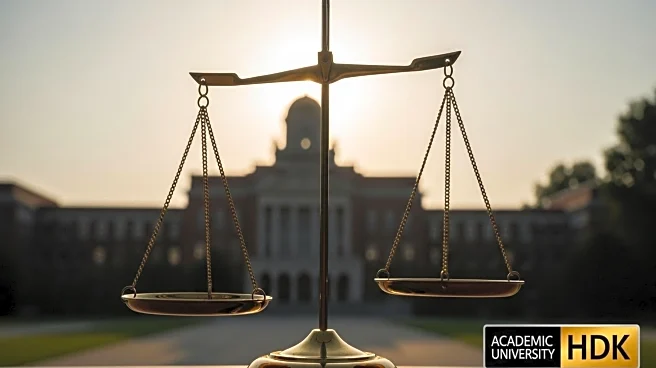What's Happening?
A federal judge, Allison Burroughs, has issued a permanent injunction against the Trump administration's ban on funding to Harvard University. This ruling is seen as a significant defense of academic freedom amidst ongoing challenges from the Trump administration. The decision prevents the administration from withholding funds, which had been a tactic to pressure Harvard into compliance with its policies. The ruling follows Columbia University's decision to pay $221 million to the Trump administration, a move criticized by former Harvard president Lawrence Summers but resisted by Harvard faculty and students. The court's decision restores funding to Harvard researchers, allowing them to continue their work without interference from the administration.
Why It's Important?
The ruling is crucial for the protection of academic freedom and sets a precedent for other universities facing similar pressures from the Trump administration. It highlights the ongoing tension between higher education institutions and government policies that may threaten their autonomy. The decision is a victory for those advocating for free expression and the independence of academic institutions from political influence. It also underscores the importance of judicial intervention in upholding constitutional rights against executive overreach. The outcome may encourage other universities to resist similar pressures and pursue legal action to protect their interests.
What's Next?
Harvard is expected to continue its legal battle to ensure the ruling is upheld and to prevent any future attempts by the Trump administration to impose funding bans. The case may eventually reach the Supreme Court, where conservative justices will have to decide between supporting the administration's actions or upholding the law and constitution. The decision could have broader implications for the relationship between the government and higher education institutions, potentially influencing future policies and legal strategies.
Beyond the Headlines
The case raises questions about the balance of power between the executive branch and educational institutions, and the role of the judiciary in safeguarding democratic principles. It also highlights the potential for political motivations to impact funding decisions and the importance of maintaining a separation between politics and academia. The ruling may inspire a broader movement among universities to assert their rights and challenge government actions that threaten academic freedom.










